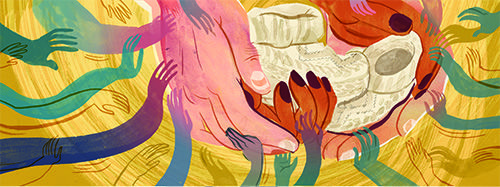Legend has it that Ernest Hemingway won a bet that he could create a novel in six words by writing the following on a napkin: “For sale: baby shoes, never worn.” Those six words suggest a tragic story of loss, with perhaps a bitter attempt to forget. My wife and I have unworn baby shoes that tell a different story.
A few months before the birth of our second child, my brother and his wife visited Ireland. They bought a beautiful pair of white, knit baby booties, a gift for our baby.
Michael was born with a severe birth defect, unknown to us until after his birth but announced when the medical team had to resuscitate him when he was just minutes old. It was the first of several resuscitations over the next 11 days, until the last one failed and tearful nurses let us hold him for his last breaths.

Michael was born at about 2:40 a.m. on December 6, Saint Nicholas Day. Before the sun came up, the doctors told my wife and me that he would have to be transferred to another hospital with better neonatal intensive care facilities, where they would perform tests to diagnose his problems. Later that day, a doctor told me Michael’s condition was “incompatible with life,”
a phrase I remember better than anything else said to me in my entire life.
The next day, with the tests in, another doctor gathered us with our extended family in a hospital room and told us Michael had a chromosomal disorder that would create numerous developmental problems and shorten his life dramatically. Most children with the condition, he said, were typically miscarried. In the silence, my dad wept the most of all of us.
My brother and sister-in-law gave Michael his booties in the hospital. So, technically, they are not unworn. We put them on his tiny feet and have photos of him in his newborn intensive care unit (NICU) bed, the shoes as big as his legs. He wore them when a nun on the ministry staff in the Catholic hospital baptized him in the NICU with many of our family members watching from the hallway.
During his short life, he was blessed, as were we, by the presence of many family members, some who traveled long distances to meet Michael and support us. The doctor warned us to let ourselves have our time and not to worry about comforting our visitors. It seemed like good advice, but not very necessary. Certainly some people needed consoling (my dad most conspicuously) or distracting (those who offered medical or legal advice) or just space (to curse God for letting it happen). All grieved for and loved Michael and us.
A few months after Michael’s death, we met with a genetic counselor at the hospital. After explaining Michael’s condition and the randomness of it, she asked if we’d found more strength in our faith through the experience. I think I demurred. In fact, I’d found myself a little turned off by the ministry team’s well-intended invoking of the images of my preschool coloring books, angels and saints.
Still, I had felt some kind of support. The catch in my throat during his baptism emerged from some deep resonance during the ritual between Michael, me, our group and God. It took a few years to give words to what I think I was feeling; then I learned of Rev. William Sloane Coffin’s eulogy for his son, dead in a car accident as a young adult. Offended when confronted by well-wishers who couldn’t understand how God could let it happen, Coffin knew instead that, when his son died, “God’s heart was the first of all our hearts to break.”
The ministry team had told us an infant did not require a funeral Mass, but we chose to have a service in the small hospital chapel. Many friends and family, bosses and co-workers attended. His burial out of town in a plot shared with my wife’s grandparents also drew family and friends. The love and care of all these people got us through this. I always want to tell people in tragic situations — like the unknown character in Hemingway’s tiny novel — that the secret formula is to be surrounded by people who care for you, a luxury often beyond our control. Usually reluctant to ascribe divine intent, I believe God’s will for us — God’s gift — was to have all these people around us. At the memorial service, my brother read Shakespeare:
“… if the while I think on thee, dear friend,
All losses are restored and sorrows end.”
Michael wasn’t buried with the booties. They stayed with us and have not been worn since, not by his three younger siblings, born over the following eight years. They have always been Michael’s booties. Our Advent baby, the gift of Saint Nicholas, left his mark on our subsequent Christmases. There’s grief in the memories, of course, but also the love he drew out of so many people. His shoes, which always hang on our tree, remind us.
Like Hemingway’s, ours was a tragic — but not bitter — story. I’m glad we kept the shoes.
Patrick Gallagher lives in Aberdeen, South Dakota, where he works for the Catholic school system.